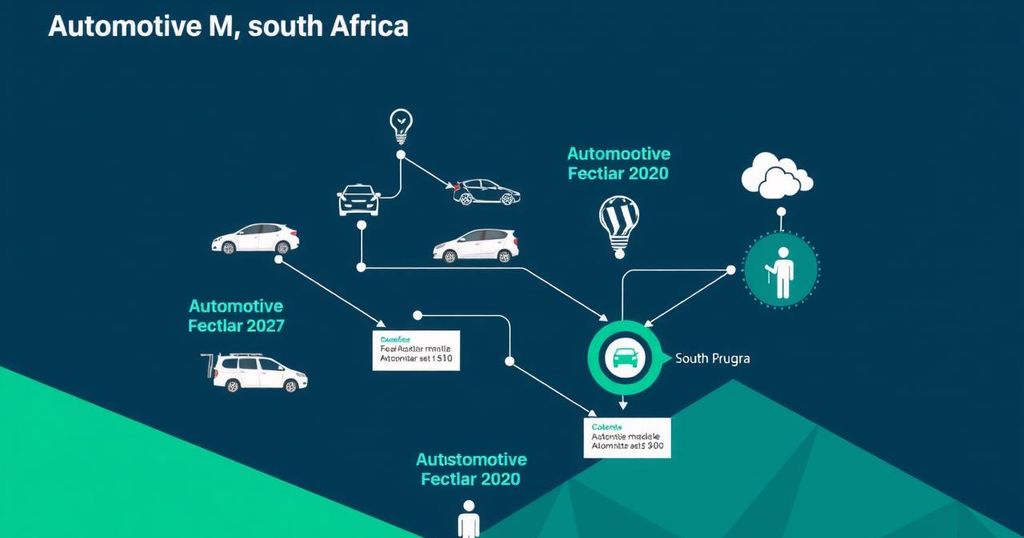Insightful Analysis of South Africa’s Evolving Automotive Digital Landscape

The South African automotive market is evolving, with a report highlighting key insights on digital engagement, search intent, and social sentiment. Major findings indicate that online behaviors are now crucial indicators of purchase intent and brand perception, emphasizing the need for strategic, community-focused marketing. Luxury brands must redefine their value to remain relevant amidst economic pressures, while influencer marketing shows promise when paired with ongoing consumer engagement.
The digital landscape of South Africa’s automotive market has been analyzed in a report developed by Rogerwilco, in partnership with YOUKNOW. This report offers key insights about consumer behaviors, search trends, and digital engagement strategies crucial for marketers and business leaders in refining their approaches and enhancing brand positioning.
Key findings highlight that online search intent is a strong predictor of consumer demand, shaping showroom visits and market share. Additionally, brand perception is heavily influenced by social sentiment, underscoring the need for active community engagement beyond maintaining a digital presence.
Strategies focusing on digital-first initiatives have proven effective, with new entrants demonstrating that sales are influenced by perceived value as much as by product quality. Luxury brands are urged to redefine their value proposition, balancing aspiration with affordability to stay relevant in a price-sensitive market.
While influencer marketing can increase brand visibility, sustainable success relies on long-term strategies engaging communities and offering consistent follow-up content. Automotive marketers are encouraged to pivot from passive promotion to active dialogue with consumers, ensuring relevance in a shifting digital landscape.
The South African automotive market reported a 3% decline in new car sales in 2024, reflecting consumer behavior changes towards affordable and fuel-efficient vehicles. Notably, sales of passenger vehicles rose by 1.1%, indicating a preference for economic options amidst economic pressures. Mongezi Mtati, a key figure at Rogerwilco, indicates that declines in online discussions about car brands align with these sales trends.
Brands such as Volkswagen, Toyota, and Suzuki are effectively transforming digital visibility into sales, while challenger brands like Omoda and Jaecoo are gaining traction by delivering accessible quality and engaging in influencer marketing.
During a webinar discussing these findings, industry leaders emphasized the shift towards affordable luxury vehicles, highlighting the challenge faced by high-end brands like BMW and Mercedes-Benz which are perceived as unattainable by many consumers. Bobby Ramagwede noted that ownership preferences are shifting towards more utilitarian uses driven by affordability.
Social sentiment correlates with vehicle sales, with a downturn in online mentions reflecting overall sales decreases. Shaun Pearson pointed out the potential of analyzing online discussions to foresee market performance. To maintain sales momentum, brands must convert search visibility into engaging content and trustworthy customer experiences.
Influence plays a key role in driving brand awareness, yet sustainable engagement is vital. As Pearson suggested, consistent community management and digital touchpoints are essential for nurturing brand-customer relationships.
In conclusion, the evolving South African automotive landscape reveals that a data-driven, community-centric approach is pivotal for brands aiming to thrive. Marketers must actively foster trust, engagement, and transparency to effectively leverage insights for future growth.
The report reveals a critical shift in South Africa’s automotive market, emphasizing the significance of digital engagement, influencer collaboration, and community interaction. Market dynamics indicate a growing preference for affordable options while highlighting the importance of reputation and consumer sentiment as driving factors of market performance. The need for marketers to adopt proactive strategies that integrate search data and real-time consumer sentiment is fundamental to achieving sustained growth in this evolving landscape.
Original Source: www.zawya.com




